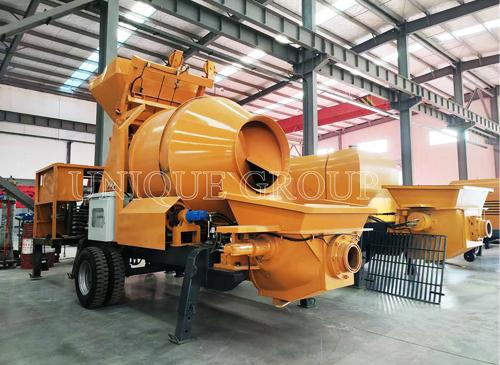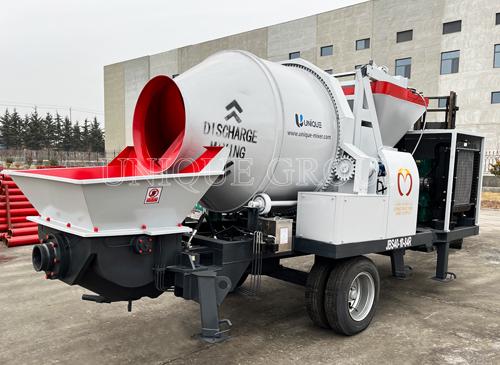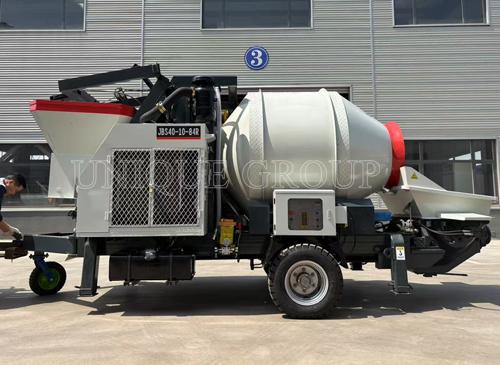What is the Advantage of Concrete Mixing Pump?

Concrete Mixer Pump: A Game-Changer in Modern Construction
In modern construction, concrete production and delivery are critical operations that directly affect project timelines, costs, and quality. Traditionally, concrete mixers and pumps have operated as separate units, often leading to inefficiencies, higher operational costs, and potential delays. However, the advent of the concrete mixer pump has revolutionized construction workflows. By seamlessly integrating mixing and pumping into a single machine, the concrete mixer pump offers unmatched efficiency, flexibility, and reliability—making it an indispensable tool for construction professionals.
What Is a Concrete Mixer Pump?
A concrete mixer pump is a multi-functional construction machine that combines the functions of concrete mixing and concrete pumping. It integrates batching, mixing, and pumping into a compact, mobile unit capable of handling concrete operations directly at the construction site. This all-in-one solution eliminates the need for separate mixing and pumping equipment, significantly streamlining the construction process.
Imagine the traditional method as a relay race—with separate teams for mixing, transporting, and pumping concrete, prone to coordination issues and delays. In contrast, a concrete mixer pump performs like a single elite athlete running the entire race flawlessly, ensuring smooth and continuous operation from start to finish.
Key Advantages of Concrete Mixer Pumps
1. Boosts Construction Efficiency
One of the most compelling benefits of a concrete mixer pump is its ability to perform both mixing and pumping on-site. Traditional workflows involve mixing concrete at a batching plant, transporting it to the site using concrete trucks, and then pumping it into place. Each step adds time, complexity, and risk of material degradation.
With a concrete mixer pump, these steps are eliminated. The concrete is mixed fresh on-site and pumped immediately to the desired location. This reduces delays, eliminates the risk of concrete segregation during transport, and ensures the material arrives in its optimal state. As a result, project timelines are shortened, and construction efficiency improves significantly.
2. Reduces Overall Project Costs
While the initial investment in a concrete mixer pump may be higher compared to standalone machines, the long-term savings are substantial. By integrating two machines into one, the need to purchase and maintain separate mixers and pumps is eliminated. This reduces capital expenditure and maintenance costs.
Additionally, operating a single unit reduces labor costs—fewer operators are required, and fewer handoffs are needed between teams. The on-site production of concrete also cuts transportation costs and lowers the likelihood of delays or rework due to quality issues. These cumulative savings contribute to a significant reduction in total project costs.
3. Enhances Construction Flexibility
Modern construction projects vary greatly in scale, location, and complexity. The mobility and adaptability of a concrete mixer pump make it ideal for diverse job sites—from narrow urban developments to remote rural locations. These pumps can be easily transported and deployed, even in areas with limited access or difficult terrain.
Furthermore, they offer real-time control over concrete mix ratios and pumping speeds. This allows construction teams to fine-tune the concrete properties to meet specific requirements, improving the precision and adaptability of the construction process.
4. Improves Concrete Quality
Concrete quality is critical to the structural integrity of any building or infrastructure. With a concrete mixer pump machine, concrete is mixed immediately before use, ensuring maximum freshness, consistency, and workability. On-site mixing allows precise control over variables such as water-cement ratio, aggregate size distribution, and admixture proportions.
This real-time quality control helps eliminate issues like premature setting, segregation, or inconsistency, which are often encountered with pre-mixed concrete transported over long distances. The result is higher-quality concrete, fewer defects, and reduced risk of structural failures or costly repairs.
5. Promotes Environmentally Friendly Construction
Sustainability is a growing priority in the construction industry. Concrete mixer pumps contribute to greener building practices in several ways:
-
Reduced material waste: On-site mixing reduces concrete spillage and overproduction.
-
Lower emissions: By eliminating transport from batching plants, emissions from concrete trucks are significantly reduced.
-
Efficient energy use: A single machine consumes less power than two separate units running simultaneously.
These advantages align with environmental regulations and help construction firms meet green certification standards and sustainability goals.
Applications Across Project Sizes
Whether it’s a small residential project, mid-sized commercial development, or a large-scale infrastructure build, concrete mixer pumps provide a scalable solution that suits a wide range of construction scenarios. Their ability to handle varying concrete strengths and volumes makes them ideal for foundations, walls, columns, bridges, tunnels, and more.
Their compact footprint also makes them highly suitable for confined spaces and interior work, where maneuverability and efficiency are paramount.
Conclusion
The concrete mixer pump represents a transformative innovation in construction technology. By combining mixing and pumping functions into a single, mobile unit, it delivers enhanced efficiency, reduced costs, superior flexibility, improved quality, and eco-friendly operation. As construction continues to evolve toward more intelligent and sustainable methods, concrete mixer pumps are becoming a vital tool in modern job sites.
Contractors, builders, and developers looking to gain a competitive edge and streamline operations should strongly consider integrating concrete mixer pumps into their workflow. With their proven benefits across efficiency, cost, quality, and sustainability, these machines are paving the way for a smarter and more productive construction industry.
- Information Technology
- Office Equipment and Supplies
- Cars and Trucks
- Persons
- Books and Authors
- Tutorials
- Art
- Causes
- Crafts
- Dance
- Drinks
- Film
- Fitness
- Food
- Jeux
- Gardening
- Health
- Domicile
- Literature
- Music
- Networking
- Autre
- Party
- Religion
- Shopping
- Sports
- Theater
- Wellness





